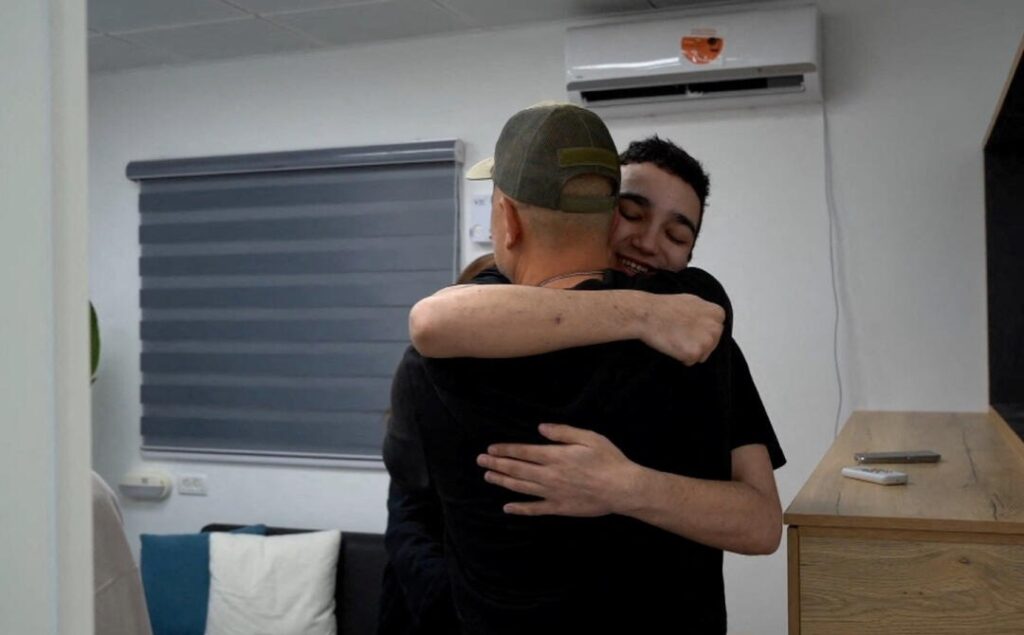After nearly seven months in captivity, U.S.-Israeli dual national Edan Alexander was released from Hamas custody on Monday, marking the final release of a living American hostage held in Gaza. His freedom, brokered through a rare multi-party diplomatic channel led by former President Donald Trump, is being hailed in Washington as a major humanitarian victory—but has drawn sharply mixed reactions across the Israeli political spectrum.
The 20-year-old New Jersey native, who was serving in the Israel Defense Forces (IDF) when he was captured during Hamas’s October 7, 2024, cross-border assault, was handed over to Red Crescent representatives near the Rafah crossing and transferred to Israeli security officials before being flown to a hospital in central Israel. According to Israeli medical staff, Alexander is in “relatively good health” and is undergoing debriefing and physical evaluation.

“Edan is finally coming home,” said his mother, Sigal Alexander, at a press briefing in Teaneck, New Jersey. “We are overwhelmed with gratitude—for every official who worked to bring him back, and for the people who prayed for our son.”
The deal was brokered over several months through behind-the-scenes negotiations involving Qatar, Egypt, and Turkey. But it was the intervention of former President Trump—currently the Republican frontrunner for the 2024 election—that ultimately secured the breakthrough, according to senior officials briefed on the matter.
Trump reportedly used backchannel communications with Qatari leadership and Egyptian intelligence to pressure Hamas into releasing Alexander without further preconditions. He also offered undisclosed incentives involving future reconstruction aid and prisoner exchange flexibility.
“This is what leadership looks like,” Trump declared in a campaign rally in Michigan shortly after news of the release broke. “When I say I’ll bring our people home, I mean it.”
The Biden administration offered a more measured response. Secretary of State Antony Blinken confirmed the State Department was involved in parallel efforts but declined to comment on Trump’s role, stating only: “We are deeply relieved Edan Alexander is safe and reunited with his family. Every American life matters.”
While Alexander’s release was celebrated by his family and community, the method—and timing—of the agreement has sparked controversy in Israel, where the war against Hamas continues amid rising domestic tensions.
Prime Minister Benjamin Netanyahu’s office issued a terse statement welcoming Alexander’s return, but sources close to his coalition expressed frustration over being “circumvented” in what they called an “external, unilateral diplomatic maneuver.”
Critics within the Israeli government worry that the release may come at a strategic cost—potentially emboldening Hamas by rewarding it with global legitimacy without a broader hostage deal for the remaining Israeli captives, living or deceased.

“This is a dangerous precedent,” said Benny Gantz, opposition leader and former Defense Minister. “No release should occur without coordination with the Israeli government. Edan’s freedom is a blessing—but we must ask at what cost.”
As of today, Israel confirms 27 hostages remain unaccounted for in Gaza, most presumed dead. Several negotiations for broader exchanges have stalled amid Hamas’s demands for a full ceasefire and prisoner release, and Israel’s continued military campaign in southern Gaza.
The release also casts a spotlight on the shifting geopolitical dynamics of hostage diplomacy. Trump’s direct involvement in the negotiations—without official government authority—has raised questions about private diplomacy during an election cycle.
Some analysts view it as a Trump campaign maneuver designed to undercut President Biden’s foreign policy credentials.
“This is Trump’s Benghazi moment in reverse,” said Dr. Aaron David Miller, former State Department Middle East adviser. “He turned a hostage crisis into a campaign win—and Biden was caught flat-footed.”
Others warn it could open a dangerous path for foreign actors to use hostages as bargaining chips in American politics.
“When non-state actors see that political figures can negotiate independently of the government, it adds volatility to an already fragile equation,” said Ilan Goldenberg, senior fellow at the Center for a New American Security.
Edan Alexander’s release may have closed one chapter in the ongoing Israel-Hamas war, but it opens others: How many more hostages remain? Can further releases be secured without political fragmentation? And will American politics now play an even bigger role in Middle East diplomacy?
For now, one family is whole again. But for Israel and the broader region, the questions—and the conflicts—persist.








